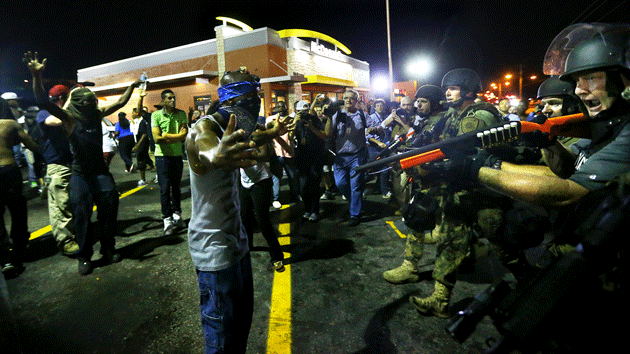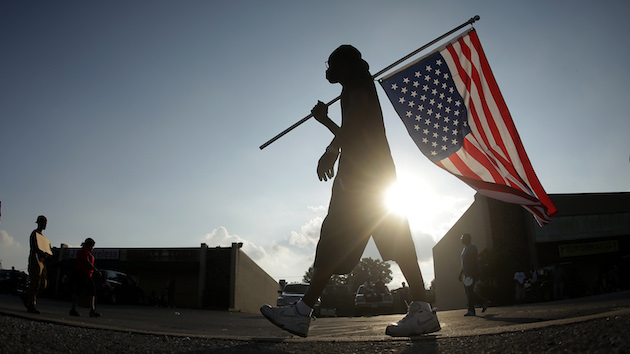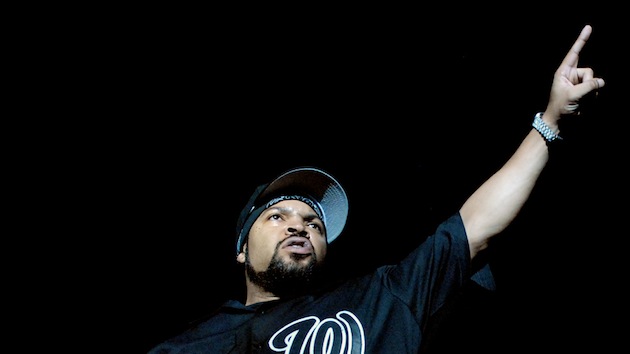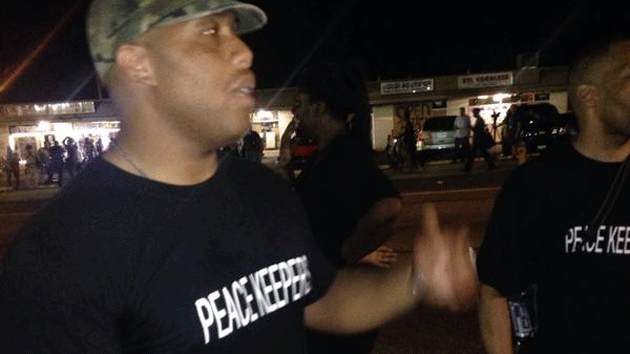
Paul Muhammad, an organizer of the Peacekeepers.<a href="https://twitter.com/RobertKlemko/status/501934861134086144/photo/1">Robert Klemko</a>/Twitter
Peace prevailed last night in Ferguson, Missouri—for the most part. There were a few bottles hurled at the cops, and dozens of arrests, but no gunshots, looting, tear gas plumes, or fusillades of rubber bullets. Largely to thank for this turn of events are the Peacekeepers, a group comprised of mostly of Ferguson and St. Louis locals who’ve been physically inserting themselves between police and rowdy protesters over the past few days in an effort to diffuse tensions.
The Peacekeepers’ unofficial leader is Paul Muhammad, a linebacker-sized guy from St. Louis who favors fatigues but reportedly speaks in the soft tones of a therapist. Little is known about Muhammad, who did not immediately return a call from Mother Jones. “If you are going to be out here all night, I will be out here all night. Let’s just go home,” he told a teenager with a red bandanna over his face last night, according to Newsweek‘s Robert Klemko. A few minutes later, someone from a fringe group of onlookers hurled a water bottle and police moved in to disperse the crowd.
Members of the Peacekeepers have been active during the late-night protests since at least Wednesday, when Renita Lamkin, an African Methodist Episcopal Church pastor, was shot with a rubber bullet while attempting to mediate between police and protesters:
Over the next few days, Lamkin helped form the ad-hoc Peacekeepers group. Many volunteers turned out in response to a call during an August 12 church service by Rev. Al Sharpton for 100 men to step forward to be “Disciples of Justice” to keep the peace in the area.
The idea to make “Peacekeepers” shirts to help differentiate the group from other protestors was Muhammad’s, Lamkin told me. He posted a request on his Facebook page and the next day the shirts arrived. They’re now worn by about 10 to 12 people who conduct the nightly patrols. Here’s Lamkin in hers last night:
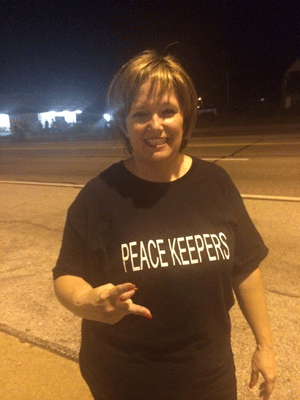
Lamkin sees the Peacekeepers as a critical way to protect both police and protesters. “We don’t want police officers injured and we don’t want our young people’s lives altered,” she told me. “I often tell young people: “Don’t make permanent decisions in a temporary place. In this one moment, don’t do something that is going to result in a permanent decision for your life.”
The Peacekeepers have learned a few important lessons since last week. Since Sunday night, when Lamkin got pushed into side streets by police and cut off from her car, the group now keeps someone “on the outside” who can pick up people who’ve been cordoned off from the action. On Tuesday night, she ferried several loads of people back to their own cars.
When people ask Lamkin whose side she’s on, she replies that she’s “on the side of life.” Her goal, she clarifies, is “preserving life” so that “everybody goes home.”
“The people trust us and they know that we care about them,” she says. “So there’s the difference: It’s the difference love brings to a situation.”
“I ain’t expecting the police to love on folks; they’re there to do a job,” she adds. “Our job is to bring the love.”

